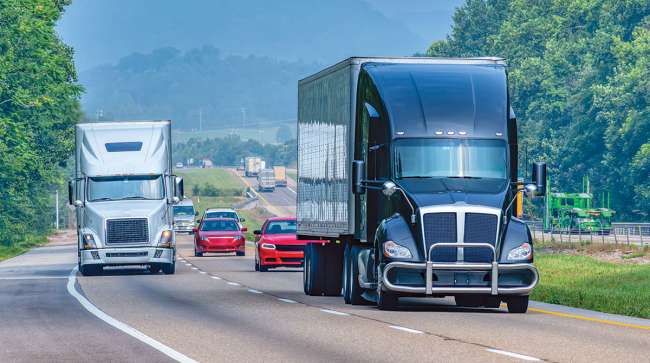Spending from the Highway Trust Fund has exceeded revenues since 2001, according to Transportation and Infrastructure Chairman Sam Graves. (WendellandCarolyn/Getty Images)
WASHINGTON — Policymakers in the House of Representatives will prioritize traditional surface transportation projects when they kick off negotiations on a multiyear highway policy bill over the coming months.
That was the recent message from Rep. Sam Graves (R-Mo.), chairman of the Transportation and Infrastructure Committee, who said he plans to direct his colleagues’ attention to big-picture highway projects while maintaining a focus on traditional connectivity corridors.
The chairman detailed his “back to basics” vision for the upcoming legislation in a recent editorial in a Washington publication.
“In the next surface transportation reauthorization bill, we’re going back to basics,” Graves said. “After recent years of expanding and creating more programs, spending money we don’t have and losing money to project approval inefficiencies, we can and must focus on our most fundamental infrastructure needs.”
The One Big Beautiful Bill delivers historic tax relief for families, seniors and American workers. It cuts wasteful spending, secures the border, and unleashes American energy, while ensuring we have a strong military.
As Chairman of the Transportation and Infrastructure…
— Rep. Sam Graves (@RepSamGraves) July 3, 2025
The next multiyear highway bill, he continued, also will aim to streamline federal environmental permitting processes and resolve long-standing concerns with a highway funding account. The Trump administration has been pushing for faster project approvals linked to permitting rules and regulations. Per funding concerns, policymakers and stakeholders have called for reforms to ensure sustainability.
Revenue from the federal Highway Trust Fund is projected to fail to meet requisite levels in about two years. The fund, used to assist with the maintenance of surface transportation corridors, is backed by insufficient revenue from the federal gas and diesel tax. Those rates were set in 1993.
Graves explained, “There’s broad agreement that the gas tax is no longer a sufficient source of funding for the [Highway Trust Fund]. One major reason is because of ever-increasing fuel efficiency of vehicles. In addition, more vehicles are using less gasoline, or none, in the case of electric vehicles (EVs), meaning that they’re not keeping up their end of the bargain in a user-pays system.
TT’s Seth Clevenger and Mike Senatore unpack the trends, surprises and shake-ups that define this year’s Top 100 for-hire carriers. Tune in above or by going to RoadSigns.ttnews.com.
“Since 2001, spending from the [Highway Trust Fund] has simply exceeded its revenues. That’s why we need to find a more sustainable solution that maintains the conservative user-pays principle.”
Graves pointed to the potential for considering fees for drivers of electric and hybrid vehicles. During Congress’ consideration of the “One, Big, Beautiful Bill,” the House approved a $250 annual registration fee on electric vehicles and a $100 annual fee on hybrids.
“These new, more equitable user fees would represent the first new funding stream into the Highway Trust Fund in over 30 years and ensure that everyone pays into the Trust Fund. Fixing the [Highway Trust Fund] is long overdue, and Congress must tackle this growing problem,” the chairman further emphasized. The fees were ultimately removed from the tax and budget law President Donald Trump enacted July 4.
Earlier this year, Graves’ panel reviewed funding proposals for surface transportation programs as part of the upcoming highway legislation. The House panel has yet to schedule a legislative markup on the multiyear policy measure.
Current federal highway operations have congressional approval through the fall of 2026. Federal highway programs were last authorized as part of 2021’s Biden-era $1.2 trillion Infrastructure Investment and Jobs Act.
On the other side of the Capitol, the Senate’s highway policy committee also has started to explore potential provisions to be included in the upcoming highway bill.
Safety, supply chain and the permitting process will guide the senators’ policymaking directives when they formally begin drafting the next comprehensive highway bill later this year, explained Environment and Public Works Committee Chairwoman Shelley Moore Capito (R-W.Va.).
“As we approach the expiration of those provisions at the end of 2026 in September, we want to continue what is working, but discontinue what isn’t working,” the chairwoman told fellow senators near the start of the year. “This review of the real-world impacts of the [Infrastructure Investment and Jobs Act] and the feedback on what is working, and what isn’t working, will inform this committee’s bipartisan work on the upcoming surface transportation reauthorization bill.”
EPW ranking member Sen. Sheldon Whitehouse (D-R.I.) in February stressed the need for crafting a new bipartisan highway policy measure.
“The historic bipartisan infrastructure law is the law,” he said. “We have a lot of good, serious, bipartisan work to do to write the next surface transportation reauthorization. I am ready to roll up my sleeves, get to it and pass the next authorization — together.”







